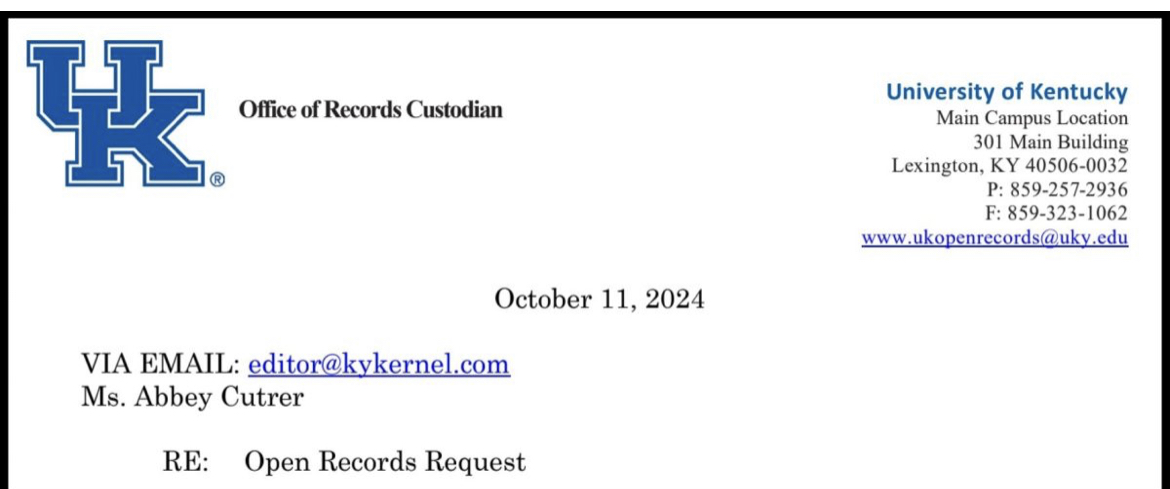

Kentucky Kernel Managing Editor Casey Sebastiano reports that the University of Kentucky has denied the newspaper's request for records identifying "non-UK student guests of Chellgren Hall on Sept. 20, 2024," and of any occasion where Chase McGuire, who has been charged with rape and attempted strangulation of a student in that resident hall, has "signed into a residence hall this academic year."
https://kykernel.com/106664/news/university-of-kentucky-denies-open-rec…
Feels a bit "like déjà vu all over again," to quote the late, great New York Yankees coach, Yogi Berra.
The request "was filed as part of a Kernel investigation of residence hall visitation protocol compliance following the arrest of Chase McGuire, who was charged with rape and attempted strangulation of a UK student on Sept. 25."
https://kykernel.com/105640/news/man-arrested-for-rape-and-strangulatio…
In its narrowly worded request, the newspaper asked for "records the university may have of non-UK student guests of Chellgren Hall on Sept. 20, 2024, and of any occasion where McGuire signed into a residence hall this academic year."
Having apparently learned very little about prioritizing "branding" over "a safe environment [in which] students live and learn". UK's Open Records Office argued that "providing records of non-UK student guests would be 'considered an invasion of personal privacy' [and that ] the records requested were considered "preliminary" and therefore exempt.'"
https://kykernel.com/11802/opinion-editorials/game-over-uk-can-no-longe…
https://kyopengov.org/law/61878
It's denial also violated the five day period of limitation for responding to an open records request.
https://kyopengov.org/law/61880
UK did, it appears, take a lesson from the recent Kentucky Supreme Court ruling in Shively Police Department v Courier Journal, Inc. The university avoided invocation of the "open law enforcement investigation and prospective enforcement action" exception to the open records law. This was likely because McGuire's investigation and prosecution is out of its hands -- a lesson it learned in 1992's University of Kentucky v. Courier-Journal. Or it might have been because it recognized it would be impossible to articulate actual harm to McGuire's investigation/prosecution from premature disclosure of records reflecting university compliance with residence hall visitation protocol compliance.
https://law.justia.com/cases/kentucky/supreme-court/2024/2023-sc-0033-d…
https://kyopengov.org/law/court-decisions/university-kentucky-v-courier…
Or the university might have been "amphibious...hit[ting] from both sides of the plate," to again quote the legendary Yankees coach.
What is clear is that UK failed to weigh the competing public interest -- as Kentucky's courts have admonished it to do -- in monitoring university compliance with residence hall policy to ensure a safe student environment against the unspecified "invasion of personal privacy" to determine if the invasion of privacy resulting from release of sign in sheets was "clearly unwarranted."
https://kyopengov.org/law/court-decisions/univ-ky-v-kernel-press-inc
It was not.
Further, we question the application of the preliminary documents excepts -- which exists to shield a public agency's pre-decisional, deliberative records -- shields residence hall sign in sheets. There are, to our knowledge, no prior Kentucky Attorney General's open records decisions on the issue of access to public university residence hall sign in sheets -- perhaps video -- and certainly no Kentucky caselaw. But construing the preliminary documents exceptions strictly, as the open records law requires us to do , we can only conclude that their invocation here is a stretch -- and a colossal one at best.
https://kyopengov.org/law/61871
The responsive records are not preliminary documents.
This leads us to ask if we are on the cusp of another protracted legal battle pitting the University of Kentucky against The Kernel-- a battle that will almost certainly end in the University's defeat following years of legal wrangling (and the expenditure of taxpayer dollars to defend its specious position -- not to mention yet more damage to its tarnished "brand").
The Kernel is resolute:
“Our first obligation as journalists is to the truth and our loyalty is to the people. The students have a right to know if protocols are being followed in dorms."
How entrenched the university is in its position remains to be seen. The Kernel has asked that it reconsider its denial. Will it concede defeat and depart the field, or, to again quote the venerable Coach Berra, continue to make "too many wrong mistakes?


